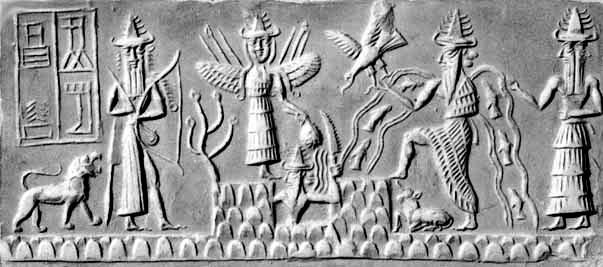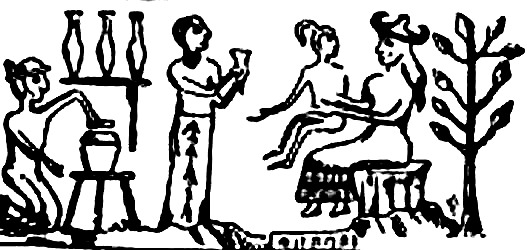Sumerian Creation Myth
October 14, 2013
Enki, lord of the universe (Source - missouristate.edu)
In the beginning there was only the goddess Nammu, the Primordial Sea who lived in total darkness until she gave birth to the universe, Anki, who was heaven and earth in one. Anki then made the air god Enlil who split the universe in two, making An, the god of the sky and Ki, who became the goddess of the earth.
Enlil and Ki would go on to have a child together named Enki, who was the god of water and the lord of the whole universe. He took some water from Nammu and created the rivers Tigris and Euphrates, making the soil fertile and rich so that he could introduce animals to the area. Many other gods and goddesses would soon be born and lived in great cities in the land between the two rivers.
The Creation of the Moon
Enlil lived in the city of Nippur along with other deities including the young goddess Ninlil, whose mother warned her to be weary when bathing in the local canal as Enlil would want to have his way with her if he were to see her naked. This motherly advice turned out to be sound and when the air god saw the young goddess, he immediately tried to seduce her. When Ninlil refused his advances, Enlil was not deterred and after obtaining a boat, he went over to where she was washing herself and raped her, impregnating her in the process with the moon god Nanna.The other gods were furious with the forced copulation of Enlil and Ninlil and exile him for his crime, forcing him to head for the underworld. As she was now pregnant with his child, Ninlil followed him but the pair would soon realise independently of each other that if she continued, her unborn baby would be forever doomed to live in the underworld.

A copy of a seal representing Enlil and Ninlil (Source - Wikipedia)
Not wanting this, Enlil disguised himself three times; once as a gate keeper, once as the man in charge of the river leading to the underworld and the third time as the ferryman. Each time Enlil and Ninlil encountered each other, he told her that she must sleep with him so that he can impregnate her with a child to reside in the underworld in Nanna’s place. Each time, the young goddess reluctantly complied, realising that it was the moon’s destiny to go heavenward.
The Creation of Man
While only the gods existed, all the hard work such as digging ditches and farm labour had to be done by the minor deities. They toiled at this work for 3,600 years before finally they decided they had had enough. They went on strike, burned their tools and surrounded the temple of Enlil who was fearful of the angry mob so sought the advice of the other great gods, especially Anu and Enki.Together, Anu, Enki and Enlil came up with a plan and decided to create a new race of beings to act as servants to the gods and do all the hard labour for them. They selected Geshtu-e, a god who was blessed with great intelligence, and sacrificed him. The birth goddess, Ninmah, mixed his flesh and blood with clay after which all the gods spat on the mixture.
Enki, along with the womb goddess, Nintu, then took the mixture into the room of fate where she recited magical incantations over it until finally, she pinched off fourteen pieces of the clay. She then set seven of the pieces to the right, which would become men and the other seven to the left, which would become women.

The Creation of man (Source - missouristate.edu)
Next the womb goddess impregnated herself with the new creation of the gods and when nine months had passed, she gave birth to them. Ninmah declared that from that day forward when a human child was born, celebrations would last for nine days, after which conjugal relations between the husband and wife could resume.
Enki’s Challenge to Ninmah
When man had been created, the gods celebrated with a feast and much drinking. Enki and Ninmah, both being very drunk, had a debate and while the birth goddess declared that it was she who decided how well each individual human would be formed, Enki countered that no matter what affliction she bestowed on a person, he would be able to find a place for them in society.On hearing this, Ninmah took the clay and made a series of people with various ailments and disabilities and each time Enki, true to his word, found a place for them. They included;
- A man with shaking hands who became an attendant to the king
- A blind man who became a story teller
- A man with twisted ankles who found a place with the metal workers
- A barren woman who was given the task to oversee the queen’s weavers
- A person with neither male nor female genitals who became an aid to the king

Enki, with his characteristic symbols, a bird, a goat and flowing water
(Source - Wikipedia)
The chief god then challenged Ninmah to find a place in society for his deformed creation which she could not do so she cursed Enki, realising that if people were born like this too often, they would stop worshiping her. In a bid to ease the wrath of the birth goddess, he admitted to her that while he can create beings, without her they would be incomplete so from that day forward, Enki and Ninmah worked together on the form of each human, and on his or her place in society.
References
Passantino, F. [Internet]. 2002. Sumerian Creation. Glendale Community College. Available from: http://web.gccaz.edu/~rbarstac/291Final/291Fall08/Thebigmyth/myths/english/2_sumerian_full.htm [Accessed October 14, 2013].Webster, M. [Internet]. 2005. Sumerian Myth. Grand Valley State University. Available from: http://faculty.gvsu.edu/websterm/SumerianMyth.htm [Accessed October 14, 2013].
Webster, M. [Internet]. 2005. The Story of Atrahasis. Grand Valley State University. Available from: http://faculty.gvsu.edu/websterm/Atrahasi.htm [Accessed October 14, 2013].
Posted by Andrew Griffiths. Posted In : Mesopotamian Creation Myths

